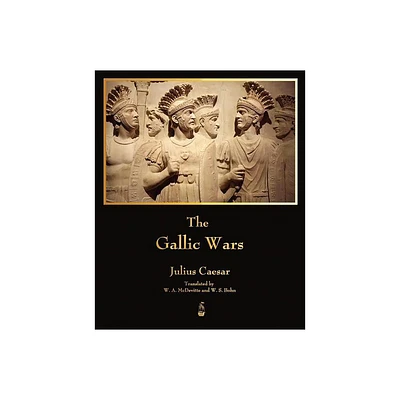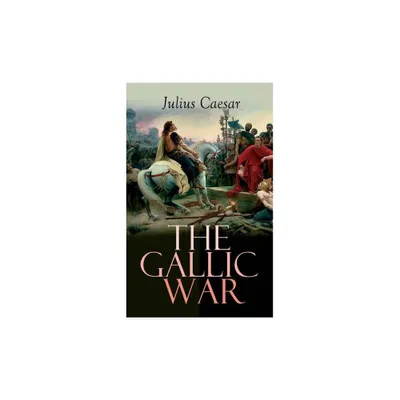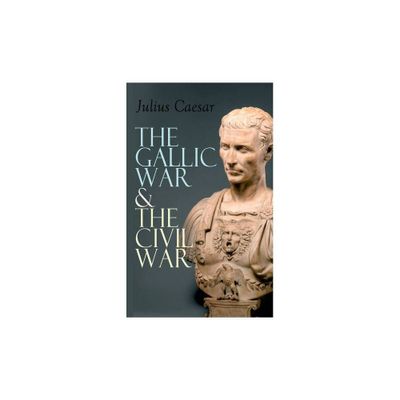Home
The Gallic Wars: "De Bello Gallico"
Loading Inventory...
Barnes and Noble
The Gallic Wars: "De Bello Gallico"
Current price: $11.95


Barnes and Noble
The Gallic Wars: "De Bello Gallico"
Current price: $11.95
Loading Inventory...
Size: OS
*Product Information may vary - to confirm product availability, pricing, and additional information please contact Barnes and Noble
The Gallic Wars, "De Bello Gallico" by Caius Julius Caesar. Commentaries on the Gallic War, also Bellum Gallicum, English: Gallic War, is Julius Caesar's firsthand account of the Gallic Wars, written as a third-person narrative. In it Caesar describes the battles and intrigues that took place in the nine years he spent fighting the Germanic peoples and Celtic peoples in Gaul that opposed Roman conquest. The "Gaul" that Caesar refers to is ambiguous, as the term had various connotations in Roman writing and discourse during Caesar's time. Generally, Gaul included all of the regions that Romans had not conquered or administered or which were primarily inhabited by Celts; except for the Roman province of Gallia Narbonensis (modern-day Provence and Languedoc-Roussillon), which had already been conquered in Caesar's time, therefore encompassing the rest of modern France, Belgium, Western Germany, and parts of Switzerland. As the Roman Republic made inroads deeper into Celtic territory and conquered more land, the definition of "Gaul" shifted. Concurrently, "Gaul" was also used in common parlance as a synonym for "uncouth" or "unsophisticated" as Romans saw Celtic peoples as uncivilized compared with Rome.
The character of the First Caesar has perhaps never been worse appreciated than by him who in one sense described it best; that is, with most force and eloquence wherever he really did comprehend it. This was Lucan, who has nowhere exhibited more brilliant rhetoric, nor wandered more from the truth, than in the contrasted portraits of Caesar and Pompey. The famous line, "Nil actum reputans si quid superesset agendum," is a fine feature of the real character, finely expressed. But, if it had been Lucan's purpose (as possibly, with a view to Pompey's benefit, in some respects it was) utterly and extravagantly to falsify the character of the great Dictator, by no single trait could he more effectually have fulfilled that purpose, nor in fewer words, than by this expressive passage, "Gaudensque viam fecisse ruina." Such a trait would be almost extravagant applied even to Marius, who (though in many respects a perfect model of Roman grandeur, massy, columnar, imperturbable, and more perhaps than any one man recorded in History capable of justifying the bold illustration of that character in Horace, "Si fractus illabatur orbis, impavidum ferient ruinae") had, however, a ferocity in his character, and a touch of the devil in him, very rarely united with the same tranquil intrepidity. But, for Caesar, the all-accomplished statesman, the splendid orator, the man of elegant habits and polished taste, the patron of the fine arts in a degree transcending all example of his own or the previous age, and as a man of general literature so much beyond his contemporaries, except Cicero, that he looked down even upon the brilliant Sylla as an illiterate person-to class such a man with the race of furious destroyers exulting in the desolations they spread is to err not by an individual trait, but by the whole genus.
The character of the First Caesar has perhaps never been worse appreciated than by him who in one sense described it best; that is, with most force and eloquence wherever he really did comprehend it. This was Lucan, who has nowhere exhibited more brilliant rhetoric, nor wandered more from the truth, than in the contrasted portraits of Caesar and Pompey. The famous line, "Nil actum reputans si quid superesset agendum," is a fine feature of the real character, finely expressed. But, if it had been Lucan's purpose (as possibly, with a view to Pompey's benefit, in some respects it was) utterly and extravagantly to falsify the character of the great Dictator, by no single trait could he more effectually have fulfilled that purpose, nor in fewer words, than by this expressive passage, "Gaudensque viam fecisse ruina." Such a trait would be almost extravagant applied even to Marius, who (though in many respects a perfect model of Roman grandeur, massy, columnar, imperturbable, and more perhaps than any one man recorded in History capable of justifying the bold illustration of that character in Horace, "Si fractus illabatur orbis, impavidum ferient ruinae") had, however, a ferocity in his character, and a touch of the devil in him, very rarely united with the same tranquil intrepidity. But, for Caesar, the all-accomplished statesman, the splendid orator, the man of elegant habits and polished taste, the patron of the fine arts in a degree transcending all example of his own or the previous age, and as a man of general literature so much beyond his contemporaries, except Cicero, that he looked down even upon the brilliant Sylla as an illiterate person-to class such a man with the race of furious destroyers exulting in the desolations they spread is to err not by an individual trait, but by the whole genus.

















